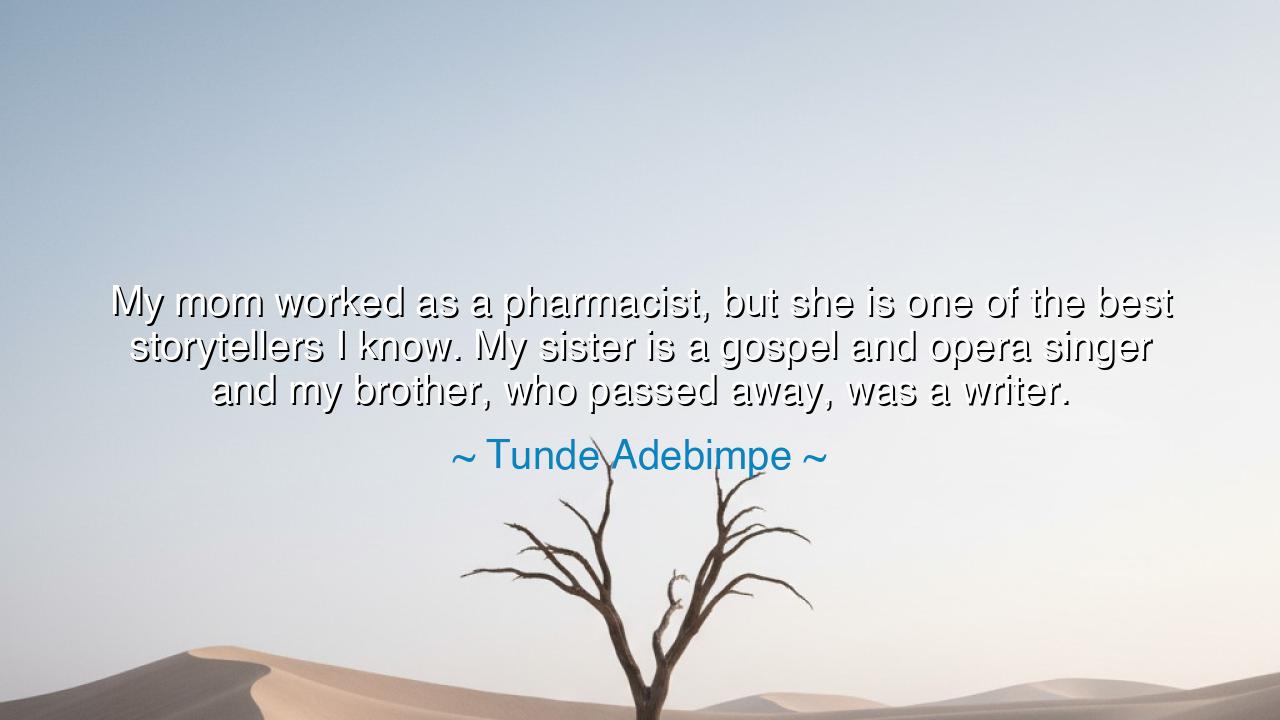
My mom worked as a pharmacist, but she is one of the best
My mom worked as a pharmacist, but she is one of the best storytellers I know. My sister is a gospel and opera singer and my brother, who passed away, was a writer.






“My mom worked as a pharmacist, but she is one of the best storytellers I know. My sister is a gospel and opera singer and my brother, who passed away, was a writer.” — Tunde Adebimpe
In these deeply human and tender words, Tunde Adebimpe speaks of a truth as old as time — that within every family, beneath the ordinary rhythm of work and duty, flows a river of creativity and spirit. His mother, though a pharmacist, carried in her the gift of storytelling, proving that art and imagination are not bound by profession. His sister sings, his late brother wrote — and through them all runs the sacred current of expression, the voice of the soul seeking to give life to beauty, meaning, and remembrance. Adebimpe’s reflection is not just a portrait of kinship, but a hymn to the inheritance of artistry — a lineage of voice, word, and wonder that transcends time and grief.
The ancients would have called such a family blessed by the Muses, those divine daughters of memory and creation. Yet Adebimpe’s story reminds us that these gifts do not descend only upon poets or priests — they dwell in the hearts of everyday people, those who heal, nurture, or sing simply because they must. His mother the pharmacist and storyteller stands as a bridge between the scientific and the spiritual. In the mixing of medicines, she healed the body; in the weaving of tales, she healed the heart. The ancients would say she served both Asclepius, god of medicine, and Calliope, muse of epic poetry — for both crafts restore the human spirit in their own way.
To call one’s mother a storyteller is to recognize the first and greatest form of wisdom. In every age, it is the mother’s voice that first gives shape to the child’s imagination. Around fires and in quiet rooms, mothers have passed down the myths, the warnings, the laughter that guide generations. Adebimpe’s mother stands among that eternal chorus of women who, while tending their work, also sowed the seeds of art in their children’s souls. Her stories were perhaps not written in books, but in the memories of those who heard her speak. This is how culture is carried — not always in libraries, but in living hearts.
And what of his sister, the gospel and opera singer? Her gift is the divine union of two worlds: the sacred and the sublime, the church and the stage. Gospel, born of faith and struggle, meets opera, born of grandeur and discipline. In her voice echoes the universal truth that all art is one prayer spoken in many tongues. She is the embodiment of harmony — of body and soul, of devotion and performance. The ancients would have seen her as a vessel of Euterpe, muse of song, whose melodies uplift even the weary spirit.
Then there is the brother who passed away, the writer — gone, yet not gone. For the written word defies mortality. In speaking of him, Adebimpe invites us to feel both the ache of loss and the immortality of art. The brother’s stories live on, not only in ink but in the memory of those who loved him. The ancients believed that to write was to wrestle with time itself — to carve meaning into the ever-fading moment. Thus, the brother joins the lineage of poets who remind us that while flesh fades, the word endures.
Through these portraits — the mother, the sister, the brother — we see the truth of Adebimpe’s lineage: creativity as inheritance, not occupation. Each family, no matter how humble, carries within it an unseen thread, binding its members through shared gifts, shared griefs, and shared voices. This is the connective tissue of the human story — that we are shaped not only by our blood, but by the art we make together and the love we share through it.
The lesson for those who listen is clear: see the art in the ordinary. Do not think that only the famous are creators, for the divine spark lies within every heart. Tell your stories, as his mother did. Sing your truth, as his sister does. Write your memory, as his brother did. In doing so, you build not monuments of stone, but bridges of meaning between the living and the dead, between the self and the world.
For as the ancients taught, “To create is to remember.” And in remembering, we keep our loved ones — and ourselves — alive.






AAdministratorAdministrator
Welcome, honored guests. Please leave a comment, we will respond soon